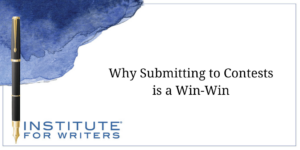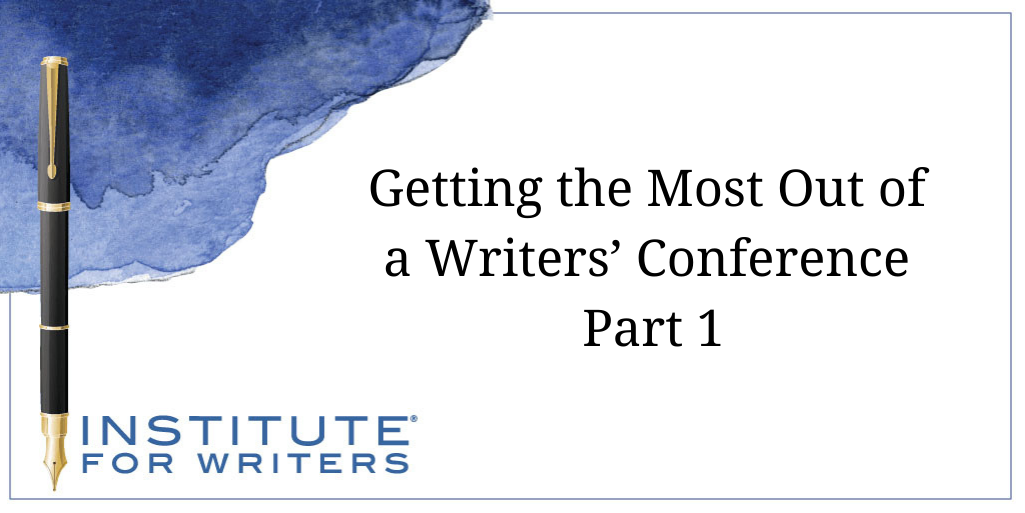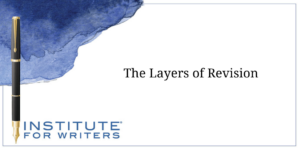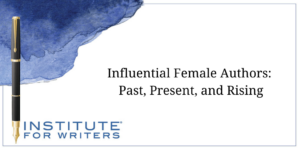
Why Submitting to Contests is a Win-Win
Should you enter a writing contest or not? If your writing rises to the top, you just might win a prize upwards of thousands of dollars if you’re lucky.

We teach our students how to write and get published!
View our Course Catalog >
Are you an aspiring writer? A published writer hoping to move into larger, more lucrative markets? Wherever you are on your writing journey, chances are that you’ve wondered if attending a writer’s conference is worth the time and expense. Although some conferences may still be virtual this year due to the COVID-19 pandemic, more and more will be reopening as in-person events. As a veteran conference attendee, panelist, and panel moderator, let me share some tips I’ve learned along the way. Let’s start by helping you find the perfect writing event to suit your needs.
It may seem obvious to select the most relevant event possible, but all too often writers hear about a conference and sign up without doing the necessary research. Attending a conference dedicated exclusively to fiction writing, for example, may not be the best choice to help you achieve your nonfiction-writing goals. Similarly, there’s not much to be gained at a conference for romance writers if your plan is to write a memoir or a how-to book. Bottom line: Study each conference schedule carefully to find the best one for you.
The fee for the conference itself is just the beginning. What will transportation cost? Will you have to pay for meals? Spend one or more nights in a hotel? Is there an extra charge for one-on-one meetings with an editor or publisher? If it’s a multi-day conference, you may find that attendees get together in the evening to head out for drinks or other entertainment. While joining in is optional, you may not want to miss out on the after-hours fun and opportunities for networking.
Savvy conference goers know there are a number of ways to save money. Inquire whether the conference offers senior discounts, scholarships for new writers, or other cost-cutting options. Sharing a double room with a writer friend cuts housing costs in half. A substantial continental breakfast and a hearty lunch are often included in the fee to attend larger conferences, but at smaller events you may be on your own for meals. Save money by planning ahead to locate reasonable dining options near the conference site.
If the cost of attending your dream conference still seems daunting, try finding one within an easy commute from your home. Small conferences take place around the country and you just might find one near you. These may not be widely advertised online or in the popular magazines for writers, but libraries and university and college English departments are often good sources of information about local writing events.
If you find a conference in or near your hometown, you can make yourself helpful by suggesting inexpensive dining options and activities for out-of-town attendees you meet during the day. Gathering a group together for lunch at your favorite café is a great way to network-a word you will hear often-with other writers.
If you are early in your career, your conference goals no doubt include learning more about breaking into print and marketing and publishing your work. Most conferences will have panel discussions or workshops devoted to these and other popular topics, and usually you will need to sign up for them in advance. Choose carefully among those being offered and be prepared for conflicts. Almost inevitably, two panels you’d love to sit in on will be held at the same time. I’ve often seen friends with similar writing interests attend different panels and later share what they’ve learned with each other. Some conferences also sell videos of panel presentations. Either of these options is preferable to leaving part-way through one presentation to attend the second half of another one, which is considered bad form. Panels are often held in small meeting rooms filled to capacity, and trying to edge toward the door can be disruptive to both the speaker and the audience.
This one is easy: Be neat, be comfortable. Unlike the suits and ties of yesteryear, business casual is today’s norm. You’ll be trying to interest editors and publishers in your professionalism, so you’ll still want to dress for success. I like to wear a skirt or slacks and a jacket with pockets to keep my business cards readily accessible. Conference room temperatures can range from overheated and stuffy to Arctic from air-conditioning, so consider tucking a lightweight sweater into your bag. Men can’t go wrong with a blazer and slacks or chinos depending on the weather. And since attendees spend a lot of time on their feet, comfortable shoes are a must for everyone.
Business casual like this should be fine for any conference; however, you can often check out what past attendees have worn by going to the conference website and scrolling through photos of previous events. You may find, for example, that at a conference devoted to outdoor adventure writing, jeans and sweaters are the norm.
On conference day you’ll need a large purse, tote bag, or briefcase. (Some conferences supply souvenir tote bags, but bring your own if you’re not sure). Handouts from speakers are inevitable and you’ll need a neat way to store them along with the business cards you’ll collect.
Business cards of your own are a must: Keep them simple, with your name, contact information, and your writing specialty or simply the words, “Freelance Writer.”.
Bringing samples of your work may or may not be a good idea. Being able to showcase your work to buying editors may seem an obvious reason for attending a writing event, but some conferences ask that you simply discuss your work with the editors and follow up a few days later with those who express interest in your book, story, or article. Other conferences may suggest bringing a resume, especially if you have been previously published, while still others may encourage you to bring copies of your completed manuscript. Check the conference guidelines carefully, and when in doubt contact the event administrators for specific information.
You’ve found an affordable and appropriate conference, mapped out your day to take full advantage of all it has to offer, planned a comfortable outfit, arranged transportation, gathered up your business cards and writing samples where requested, and now you’re ready to get the most out of your day.
My next blog will share some important tips for meeting editors and other writers, getting the most out of panel sessions, and-here’s that word again-networking to your advantage. We’ll also discuss the importance of following up with editors who have expressed interest in your work.
Related Links:
Proving that today’s technology allows us to become successful writers no matter how far we live from the publishing meccas, IFW instructor Karen Hammond writes, edits, and coaches fiction and nonfiction writers from an island off the coast of Maine. She has been widely published in national and international magazines and newspapers, taught magazine writing to university juniors and seniors for many years, and is the recipient of several writing awards. She is the author of the popular guidebook, Backroads & Byways of New England. Karen shares her island home with her husband and an office cat named Noelle who stopped by one snowy Christmas and decided to stay.

Should you enter a writing contest or not? If your writing rises to the top, you just might win a prize upwards of thousands of dollars if you’re lucky.

To many, writing is revision, and most writers revise their manuscripts numerous times before they’ve shaped it into the best version that it can be.

We’re going to look at influential female authors of the past, those impacting the present, and whom the industry expects to make a big splash.
1000 N. West Street #1200, Wilmington, DE 19801
© 2024 Direct Learning Systems, Inc. All rights reserved.
1000 N. West Street #1200, Wilmington, DE 19801
© 2024 Direct Learning Systems, Inc. All rights reserved.
1000 N. West Street #1200, Wilmington, DE 19801
© 2024 Direct Learning Systems, Inc. All rights reserved.
1000 N. West Street #1200, Wilmington, DE 19801
© 2024 Direct Learning Systems, Inc. All rights reserved.

1000 N. West Street #1200, Wilmington, DE 19801
© 2025 Direct Learning Systems, Inc. All rights reserved.

1000 N. West Street #1200, Wilmington, DE 19801
©2025 Direct Learning Systems, Inc. All rights reserved. Privacy Policy.
2 Comments